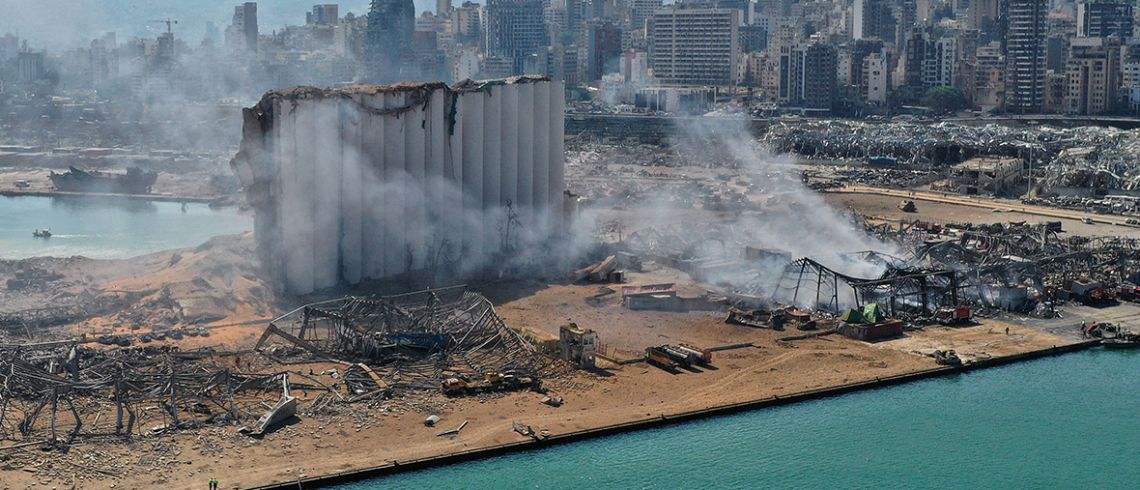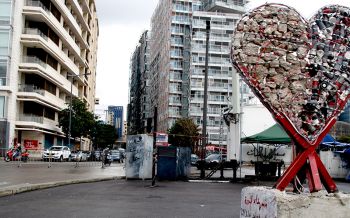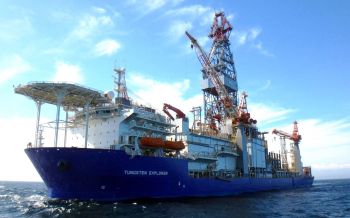The cataclysmic explosion in Beirut port on 4 August decimated a huge portion of the Lebanese capital, killing some 200 people and wounding more than 5,000, destroying businesses, infrastructure, hospitals, schools and homes. The destruction left up to 300,000 people homeless and the remainder of the city scrambling to figure out how to survive. Against this bleak backdrop, the urgent need for access to power has pushed Lebanon’s fitful gas exploration programme firmly into limbo.
International aid in the form of food and medical supplies are beginning to arrive and will likely continue for months to come. But financial assistance will come slower, only after international donors have a clearer understanding for how the explosion happened and once wide-reaching reforms that the donors demand are put in place.
Germany’s Siemens has offered to supply Beirut with two mobile SGT-A45 gas turbines for one year free of charge that will be used to provide emergency power to the city. The turbines have a combined capacity of 80 MW and can supply some 150,000 people with electricity.
Siemens said delivery and start-up should take place in the next six to 12 weeks. The units cost around USD 40 million annually to run.
A source in Beirut told Gas Matters Today that the detail of the offer is not yet clear and there has been no word from government if it will accept. Siemens Energy told Gas Matters Today that it is “in the process of clarifying the logistical conditions for the turbines”, without elaborating on where gas would be sourced to fuel the units.
“The landscape is buzzing and chaotic here,” the Beirut source said by email. “After the explosion and the government’s resignation, the focus now is on forming a new government to deal with a long list of issues, each more urgent than the other: the Beirut port explosion and its fallouts, the economic and financial collapse and its fallouts, alarming rise of new Covid-19 cases, and international aid – all of which (beside the urgent humanitarian aid), depends on a long list of reforms that Lebanon should adopt before unlocking the funds.”
Inured to suffering
Lebanon has suffered from power outages for decades, stretching back to the 1975-1990 civil war period.
Multiple attacks on power plants and years of internal corruption mean the Lebanese cannot rely on state-owned Electricite de Liban (EdL) for a steady electricity flows and have turned to private generators to fill the oftentimes long gaps in power supply. This has in turn led to the creation of what some call a ‘generator mafia’ that exploits the situation.
EdL produces about 2,000 MW, but the country requires more than 3,300 MW during the summer. Power outages have been made all the more difficult because of the financial crisis and the scarcity of dollars. Since 2013, the Turkish company Karadeniz has licenced power generation barges to Lebanon, and the country has come to depend on them.
In the past the Lebanese government has promoted an LNG-to-power programme that would see three new gas-fired power plants built on the coastline, supplied by LNG via floating storage and regasification units (FSRUs). Apart from announcing the plan, there has been little news of it since.
“The chronic power shortages were made worse by the financial crisis and the government’s default on its Eurobond debt,” the Beirut source said. “But even this ‘alternative solution’ of private generators has become more complicated with rising prices and increased difficulties to buy diesel due to dollar shortages.”
Beirut smouldering
Lebanon was in a multi-layered crisis before the blast, and the explosion of 2,750 tons of ammonium nitrate has pushed the country much further into misery.
Lebanon is tens of billions of dollars in debt, has a corrupt political class that is not trusted by the international community, bankrupt banks and a fantasy budget that has ruined the Lebanese lira and plunged the population into poverty.
Recent estimates put the extent of the physical damage of the explosion at USD 15 billion. On top of this is the presence of 1.5 million refugees from Syria’s civil war and the coronavirus, precautions for which have mainly evaporated in the wake of the explosion.
For much of the last decade, the Lebanese government had been promising the population that the country’s economic hardships would be over once the natural gas resources that lay offshore in the exclusive economic zone (EEZ) were developed. But that too took years to get underway, and now it appears that further exploration could see more delays as the country fights to overcome immediate hardships.
France’s Total, and its partners Eni and Novatek, drilled a well in Lebanon’s Block 4 earlier this year, but it was non-commercial. Since March, most drilling in the eastern Mediterranean has been suspended due to Covid-19, so it remains uncertain when drilling planned by Total for the end of this year in Block 9 will actually begin.
That proved lucky for Total. Its personnel and vessels managed to escape any harm from the port blast. The rig used in Block 4, the TransOcean Explorer, had been moved to the Cypriot port of Larnaca after the Block 4 well finished. - GL
Photo: Shutterstock
Subscription Benefits
Our three titles – LNG Business Review, Gas Matters and Gas Matters Today – tackle the biggest questions on global developments and major industry trends through a mixture of news, profiles and analysis.
LNG Business Review
LNG Business Review seeks to discover new truths about today’s LNG industry. It strives to widen market players’ scope of reference by actively engaging with events, offering new perspectives while challenging existing ones, and never shying away from being a platform for debate.
Gas Matters
Gas Matters digs deep into the stories of today, keeping the challenges of tomorrow in its sights. Weekly features and interviews, informed by unrivalled in-house expertise, offer a fresh perspective on events as well as thoughtful, intelligent analysis that dares to challenge the status quo.
Gas Matters Today
Gas Matters Today cuts through the bluster of online news and views to offer trustworthy, informed perspectives on major events shaping the gas and LNG industries. This daily news service provides unparalleled insight by drawing on the collective knowledge of in-house reporters, specialist contributors and extensive archive to go beyond the headlines, making it essential reading for gas industry professionals.





